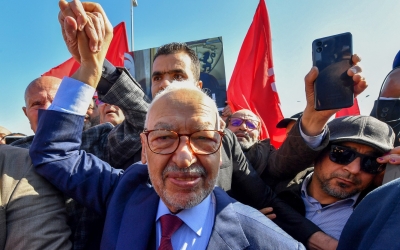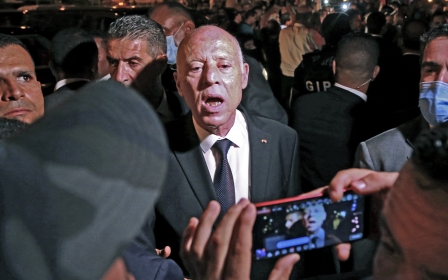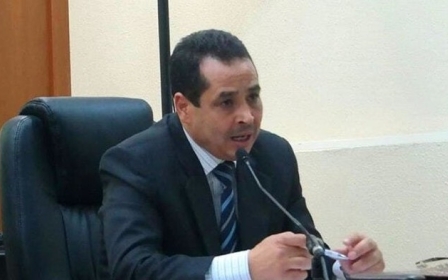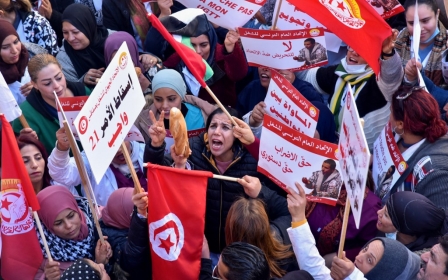Tunisia: Saied escalates power game with arrest of influential businessman
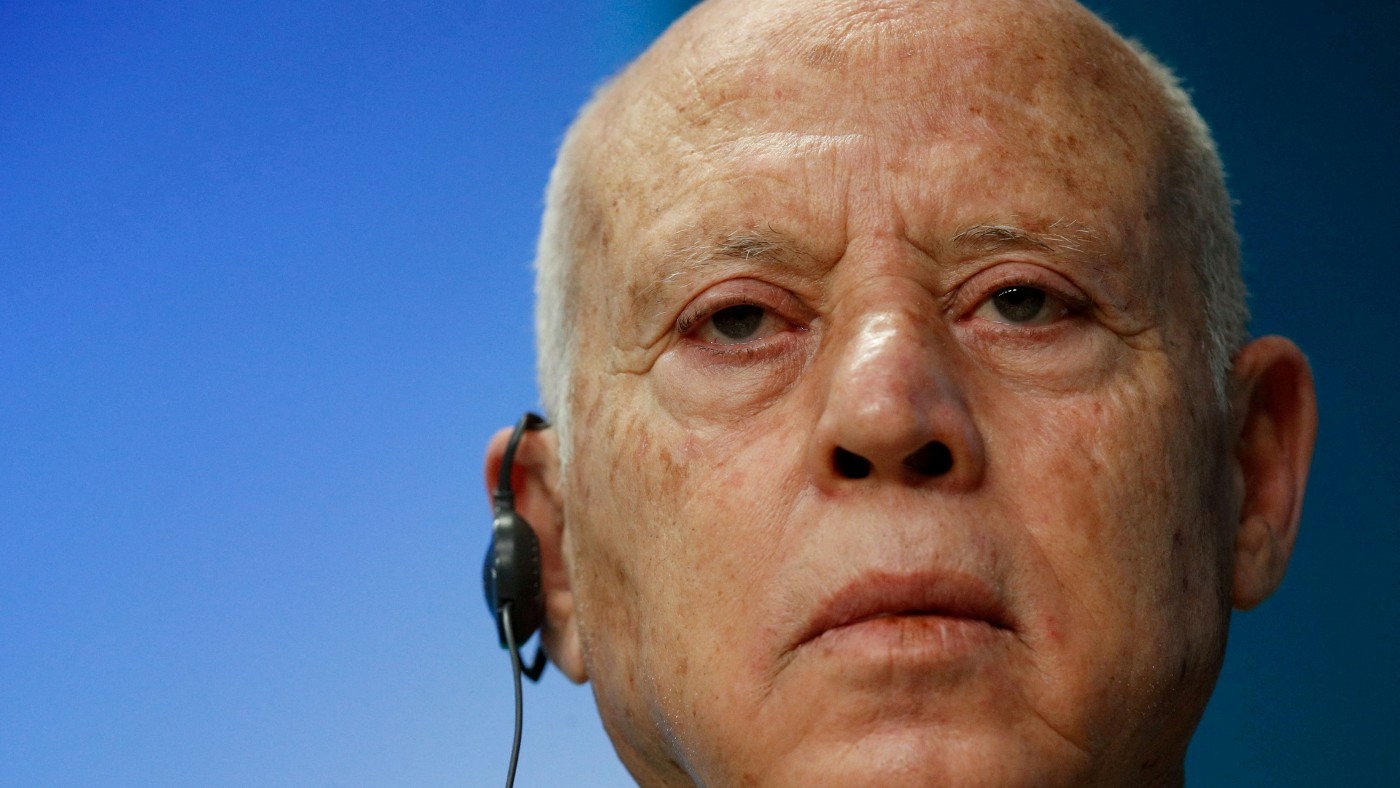
February has marked a new turn in Tunisian President Kais Saied's quest for power, as high profile arrests continue.
Nowhere is this clearer than with the detention of the country's most controversial power broker, Kamel Eltaief.
A businessman and longtime confidant of toppled authoritarian leader Zine el Abidine Ben Ali, Eltaief is known for his deep entrenchment within the interior ministry and his extensive ties to powerful political and business figures.
'I am shocked by the amateurism of the investigators... Eltaief is the kind of person that makes politicians feel threatened'
- Nizar Ayed, Eltaief's lawyer
Going after him shows Saied now commands enough power to alter the most influential networks inside the state apparatus, analysts told Middle East Eye.
The president unilaterally suspended parliament and dissolved the government in July 2021, a move he marketed as a step towards "true democracy", involving a clean break with the political class, the institutions and "corrupt elites".
New MEE newsletter: Jerusalem Dispatch
Sign up to get the latest insights and analysis on Israel-Palestine, alongside Turkey Unpacked and other MEE newsletters
He then gradually gathered vast, unchecked powers, which were later enshrined in a tailor-made constitution by which, says the opposition, Saied paved the way for a "disgraceful dictatorial regime".
The arrest of the previously untouchable Eltaief in mid-February was one in a string of busts predominantly targeting critics of the president. Saied presented this with a series of allusions to coups supposedly being plotted against his administration.
"The people recently arrested are terrorists," Saied said, commenting on the arrests. "The investigations have revealed evidence of the involvement of a number of criminals in a plot against state security."
But so far, Saied has failed to provide the evidence, Eltaief's lawyer Nizar Ayed told MEE.
"The charges are fabricated and baseless," Ayed said. "I am shocked by the amateurism of the investigators. The file contains proof of a meeting with a US diplomat. Since when is that punishable? Eltaief is the kind of person that makes politicians feel threatened," the lawyer said, recalling prior charges against his client for plotting coups.
"He does not appear in the media and therefore becomes unfathomable. He is neither for nor against Saied," Ayed added.
Clients and corruption
This kind of positioning is actually immensely unpopular in Tunisia, as it speaks to an operator who lives by cutting deals behind closed doors and building relationships with whomever is in power. In the minds of the public, Eltaief embodies corruption, clientelism and the politics of the old boys club, something that Saied has vowed to break down.
"The arrest of Kamel Eltaief is the best news since the 2011 revolution. He destroyed Tunisia. Anyone he worked with should be detained," one Facebook user wrote. Another Tunisian wrote: "Eltaief is a real criminal. A dangerous betrayer. I hope he is never released."
Public support is what Kais Saied cares about, according to analyst Sami Hamdi. "Saied is aiming to counter the growing perception that he does nothing and is capable of nothing," Hamdi told MEE.
'Eltaief's arrest indicates that his position within the deep state has weakened, in favour of Saied'
- Sami Hamdi, Tunisian analyst
Saied, though, is probably weaker politically now than at any point since he won the 2019 presidential election in a landslide.
Typically popular for his pledges to crack down on "corrupt elites", Saied instead used his expanded powers to issue a decree on criminal reconciliation, allowing businesspeople suspected of corruption, bribery or fraud to avoid punishment by investing in regional development.
Meanwhile, Tunisia is trapped in a series of neverending economic woes. Skyrocketing prices and shortages in supermarkets have destroyed Saied's reputation as a "saviour", while the national mood has descended into apathy.
"They are also the real instigators of the recurrent crises related to the distribution of goods and soaring prices," Saied said of the people who have been detained, in his first comments after the arrests.
Serious doubts about his political sustainability deepened after the record low turnout of around nine percent in the December general election. The United States was not deterred, recognising the elections "as an essential step towards restoring democracy".
Hamdi believes the international recognition has emboldened Saied. "He now knows he can do what he wants with impunity. And foreign support reinforces his credibility within the influential networks in the state apparatus, the so-called 'deep state'," the analyst said.
"Eltaief's arrest indicates that his position within the deep state has weakened, in favour of Saied. His grip on the inner circle is also reflected in the arrests of other persons who successfully penetrated the deep state, such as Noureddine Bhiri, a prominent figure within the Ennahda opposition party."
This is part of Saied's project, Hamdi says, "gathering absolute power by breaking down intermediaries, such as trade unions and anything that could interfere with his power - and public support is vital to do this. Even more crucial than foreign recognition."
For over a decade, Tunisians have waited for these arrests, former health minister Imed Hammami told MEE. "It's imperative to strip the state of cronies and 'professionals', he said. "And Saied has the bravery to do so."
The former minister said that Eltaief had "spread his tentacles everywhere".
He added that the businessman had "railed against anyone who tackled corruption. He conspired to overthrow governments before. And now he allies himself with political activists who reason like this: since Saied staged a coup, we can do it too. But this is not how democracy works."
Middle East Eye delivers independent and unrivalled coverage and analysis of the Middle East, North Africa and beyond. To learn more about republishing this content and the associated fees, please fill out this form. More about MEE can be found here.


